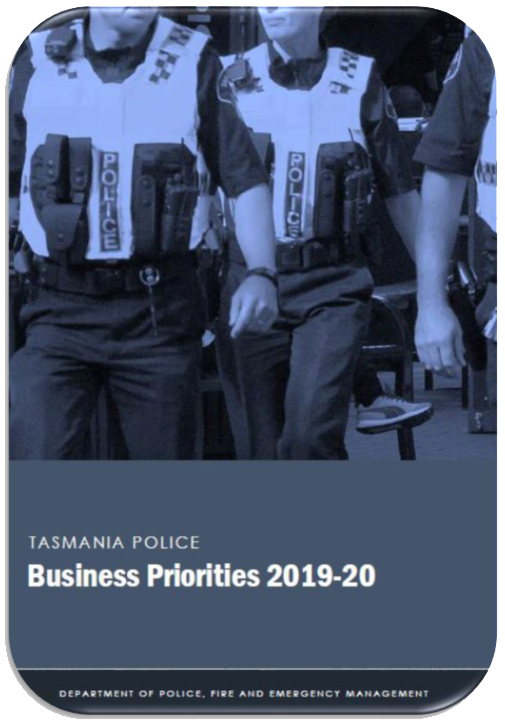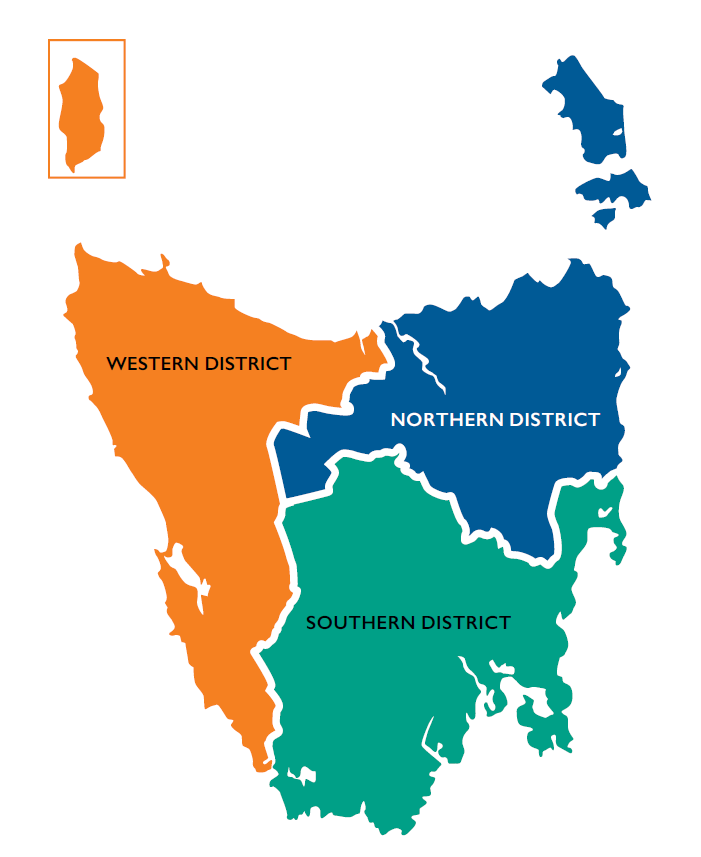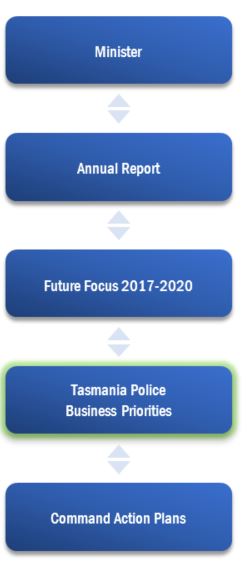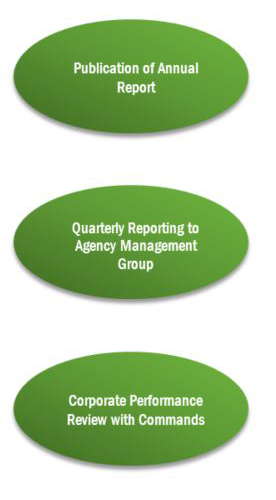 >> Download in pdf format: DPFEM Business Priorities 2019-20
>> Download in pdf format: DPFEM Business Priorities 2019-20
Message from the Commissioner
The Tasmania Police Business Priorities 2019-20 is a key strategic document to ensure that Tasmania Police delivers on its responsibility to provide quality policing services to the Tasmanian community.
Our priorities align with the Department of Police, Fire and Emergency Management’s overarching strategic framework, Future Focus 2017-20, and provide the structure for us to deliver on our four output groups: Public Safety, Crime, Traffic Policing and Emergency Management.
Policing is a high-risk and unpredictable profession, and supporting our people is a high priority. In 2019-20 we will progress a number of reforms that ensure the welfare of our people continues to be a priority. These include:
- the continued implementation of the Wellbeing Program to provide for the physical and mental health of emergency first responders
- identification of barriers and development of contemporary and supportive workplace practices that aim to embed diversity and inclusion across Tasmania Police
- consultation on and development of a Fatigue Management Policy to assist supervisors and members to more effectively manage and reduce workplace fatigue, and
- the development of a relief policy to support rural and remote stations that experience extended absences.
Tasmania Police will also develop and implement a number of key initiatives, including the Tasmania Police Road Safety Strategy and the Policing At Risk Youth Strategy, to not only ensure that we are doing our business in a coordinated and strategic way, but to ensure that we are continually striving to enhance the service we provide to the Tasmanian community.
2019-20 will also be a time of significant change for Tasmania Police. The Capability Review Project has assessed the future context facing Tasmania Police and our capability to deliver on key priorities. The review has outlined options for the future improvement of policing services, as well as delivering a draft Police Officer Allocation Model. Consultation and implementation will commence over the coming year, and I look forward to working together to progress this model to ensure we are working as effectively as possible.
D L Hine
Commissioner of Police
About Us
Tasmania Police is an operational arm of the Department of Police, Fire and Emergency Management. The Department’s other arms are the Tasmania Fire Service, State Emergency Service and Forensic Science Service Tasmania, with corporate support provided by Business and Executive Services.
Tasmania Police is responsible for delivering quality policing services in Tasmania. Tasmania Police consists of seven commands, including three geographical police districts (Southern, Northern and Western) and four specialist support commands (Education and Training, Operations Support, Professional Standards and Special Response and Counter-Terrorism).
Activities undertaken by Tasmania Police include high-visibility policing; criminal investigations including serious organised crimes operations; counter terrorism; emergency management; search and rescue operations, and improving relationships with the Tasmanian community.
This document outlines the business priorities for Tasmania Police. These priorities support the overall vision for the Department, and many involve working in collaboration with other areas of the Department.
Tasmania Police Districts Map

Business Planning

Business Monitoring

Our Vision, Mission, Values and Principles
The Department has a common vision and mission for all of its operational arms and this is supported by a set of principles. These guide the delivery of our services and the behaviours of our people. Tasmania Police supports this vision, mission and set of principles, and these underpin the priorities outlined in this document.
Our Vision:
- A safe, secure and resilient Tasmania
Our Mission:
- To provide effective policing, fire and emergency management services
Our Values:
- Integrity: We believe in honest, professional, transparent and ethical behaviour in all aspects of our business
- Equity: We believe in fair, consistent and inclusive behaviour when interacting with our people and our community
- Accountability: We believe in being answerable for our decisions and actions, behaving professionally and being responsible for our outcomes
Our Principles:
- Community Focus: We will engage and work with the community to provide effective services for the community
- Collaboration: We will work together and with others to achieve positive outcomes
- Values-led: Our service and behaviours will reflect our values
- Professional: We will be respectful, honest, confident and competent
- Accountable: We will be responsible and transparent
Strategic Direction
The strategic direction document, Future Focus 2017-2020, establishes the strategic direction for the Department. Future Focus identifies four areas of strategic focus for the Agency as a whole, and for its operational services. Tasmania Police has incorporated these into our business priorities for the year ahead to deliver strong outcomes across all levels of our activities.
Focus areas for 2017-20:
- Community Service: Delivering what the community needs to be safe, engaged and reassured.
- Leadership: Having the skills and resources to be informed, accountable and innovative in what we do.
- People: Looking after our workforce and planning for the future.
- Communication: Ensuring that our messages are heard by the community and that their voices are heard by us.
Strategic Output Groups
Police operations consist of four key areas, known as output groups. Each output group has a specific aim and set of priorities and key performance measures. These are used to track and report progress towards realising our vision:
- Output Group 1 – Public Safety
- Output Group 2 – Crime
- Output Group 3 – Traffic Policing
- Output Group 4 – Emergency Management
Tasmania Police Key Priorities
Tasmania Police has identified 11 key priorities for 2019-20 that are of strategic or whole of service significance.
Wellbeing Program
Continue with implementation of the Wellbeing Program, a proactive preventative program for the physical and mental health of emergency first responders, including intervention and support as required.
Diversity and Inclusion
Identify barriers and continue to develop contemporary and supportive workplace practices that aim to embed diversity and inclusion across Tasmania Police.
Capability Review Project
Implement agreed recommendations from the Capability Review Project, which has reviewed the future context facing Tasmania Police and the capability to deliver on key priorities. The review has outlined options for the future improvement of policing services, in five key themes: capability focused funding and two-tiered staffing model; preventative policing; flexible work practices; integrated rural policing; and investigations and intelligence.
Police Officer Allocation Model
Consult with commands and the Police Association of Tasmania on the draft Police Officer Allocation Model developed as part of the Capability Review Project and commence implementation.
New Norfolk Station, Longford Station and Sorell Emergency Services Hub
Two new stations will be built under this initiative, with consultative support from Tasmania Police. These projects will result in more contemporary police premises in New Norfolk and Longford. Planning will also commence for the development of facilities in Sorell to allow Tasmania Police, the Tasmania Fire Service and State Emergency Service to be co-located.
Body Worn Cameras
Continued implementation of the staged roll-out of body worn cameras for frontline members of Tasmania Police. This will allow a mechanism for contemporary gathering of evidence and intelligence, and enhance the safety of officers.
Project Unify
Project Unify is a digital transformation initiative. This project will replace a number of ageing and legacy systems with a new, integrated policing information system, which directly and indirectly support policing operations and external clients.
Relief Policy
This initiative involves developing a policy to support rural and remote stations that experience extended absences. The policy will aim to prevent small stations being unstaffed and will involve consultation with the Police Association of Tasmania and operational commands.
Policing At Risk Youth Strategy
Finalise and commence implementation of the Policing At Risk Youth Strategy which will provide Tasmania Police with a coordinated and strategic response to how we deal with children and young people at risk of, or who are already, repeat offending.
Fatigue Management Policy
Consultation on and development of a Fatigue Management Policy to assist supervisors and members to more effectively manage and reduce workplace fatigue.
Rapid Response Capability
Explore options for the development of an enhanced rapid response capability.
Priorities by Output Group
Output Group 1: Public Safety
Aim: For the community to feel safe and be safe
Priority Area and Key Focus:
- High visibility policing
- Satisfaction with policing services
- Satisfaction with police in dealing with public order issues
- Evaluation of operational response times
- Policing public places
- Public place assaults
- Public order
- Satisfaction with safety in public places
- Crowded places
Output Group 2: Crime
Aim: To reduce crime
Priority Area and Key Focus:
- Youth offending
- Finalise and implement Policing At Risk Youth Strategy
- Serious and organised crime
- Person offences
- Serious crime offenders
- Serious drug offenders
- Violence against women and children
- Family violence response
- Priority family violence perpetrators
- Review of electronic monitoring
- Assaults and sexual assaults against women and children
- Volume crime
- Home burglaries
- Car burglaries
- Recidivist offending
- Community resilience
- Property crime
Output Group 3: Traffic Policing
Aim: To improve driver behaviour through traffic law enforcement
Priority Area and Key Focus:
- Tasmania Police Road Safety Strategy
- Develop Tasmania Police Road Safety Strategy
- Serious and fatal crashes
- High-risk road behaviour
- High-risk drivers
- High-risk motorcycle riders
- Evade police offenders
- Speeding
- Use of seatbelts
- Alcohol and drug use
- Mobile phone use
Output Group 4: Emergency Management
Aim: To contribute towards community resilience through effective security and emergency management
Priority Area and Key Focus:
- Provide leadership and effective incident management during emergency responses
- Implement strategic command arrangements
- Operational preparedness
- Frontline capability and capacity
- Develop enhanced rapid response capability
Priorities by Support Command
Education and Training
Priority Area and Key Focus:
- Investigative Practice Training Continuum
- Conduct review of current training model and implement agreed outcomes
- Tasmania Police Recruitment Strategy
- Continue implementation of endorsed recommendations and enhancements from the review of Tasmania Police recruitment practices
- Explore new strategies to promote and support an inclusive and diverse workforce, including support of Culturally and Linguistically Diverse individuals in the recruitment process
- Update recruiting material
- Promotion Training Continuum
- Review of existing curricula
- Commence development of new curricula
- Use of Force
- Ongoing review of use of force options and provide recommendations for consideration of the Corporate Management Group
- Leadership
- Review and update the Executive Leadership Development Program guidelines
- University of Tasmania
- Develop a new Memorandum of Understanding with the University of Tasmania
Operations Support
Priority Area and Key Focus:
- Firearms Policy Enhancement Project
- Continue to progress project recommendations
- Marine and rescue capability
- Review collaborative arrangements with Surf Life Saving Tasmania
- Implement combined helicopter rescue arrangements with Ambulance Tasmania
- Police vessel replacement
- Replacement of PV Dauntless
- Commence preliminary planning for PV Van Diemen
- Radio Dispatch Services
- Continuation and consolidation of stakeholder working group to examine issues and recommendations
- Redevelopment of RDS facility
- Tasmanian Government Radio Network (TasGRN)
- Negotiate contract with preferred vendor
- Commence build of new network
- Safe Families Coordination Unit (SFCU)
- Implementation of relevant actions from the Safe Homes, Safe Families, Safe Communities: Tasmania’s Family and Sexual Violence Action Plan 2019 – 2022
- Investigation and intelligence capability
- Review current investigation and intelligence capability
- Serious and organised crime
- Implementation and enforcement of new Consorting & Prohibited Insignia legislation
- Cybercrime capability
- Review the current cybercrime training and investigation policy
- Forensic Services certification
- Identify and consider pathways to undertake a professional development model for forensics
- Review Southern Forensic Services facility
Professional Standards
Priority Area and Key Focus:
- Wellbeing protocols
- Review wellbeing protocols, in collaboration with People Support
- IAPro
- Test and implement IAPro upgrade
- Early intervention
- Finalise early intervention policy
- Trial and evaluate EIPro (early intervention software)
- Integrity Commission – Memorandum of Understanding (MoU)
- Review formal collaborative arrangements with Integrity Commission (replacement of MOUs)
- Integrity Commission – audit and review
- Assist and support the Integrity Commission to conduct audits and a 12 month review of Abacus files
Special Response and Counter-Terrorism
Priority Area and Key Focus:
- District Engagement
- Develop and deliver counter-terrorism awareness training to support frontline
- Fixated Threat – Development of policy and framework for use by districts, in conjunction with State Intelligence Service operational intelligence role
- Building/Supporting Terrorism Resilience
- Implement tiered response model for Major Event Support, including relevant training
- Continue to progress Crowded Places and Critical Infrastructure Work Plan
- Develop and deliver courses and training
- CT Awareness training – external (Critical infrastructure/Crowded Places focus)
- Counter-Terrorism Exercise Management
- Building/Supporting Capability and Capacity
- Enhanced rapid response capability
- Enhancement of Command – support to professional development for counter-terrorism commanders
- Command and Capabilities Exercise Management
- Emergency Management
- Emergency Management Information System – continued development, training and embedding in whole of government during emergencies
- Development of a business case for a State Operations Centre and new State Control Centre



